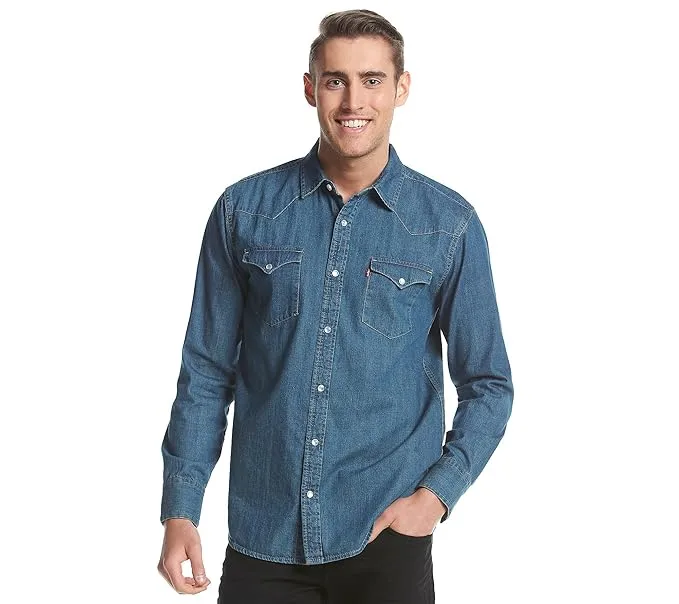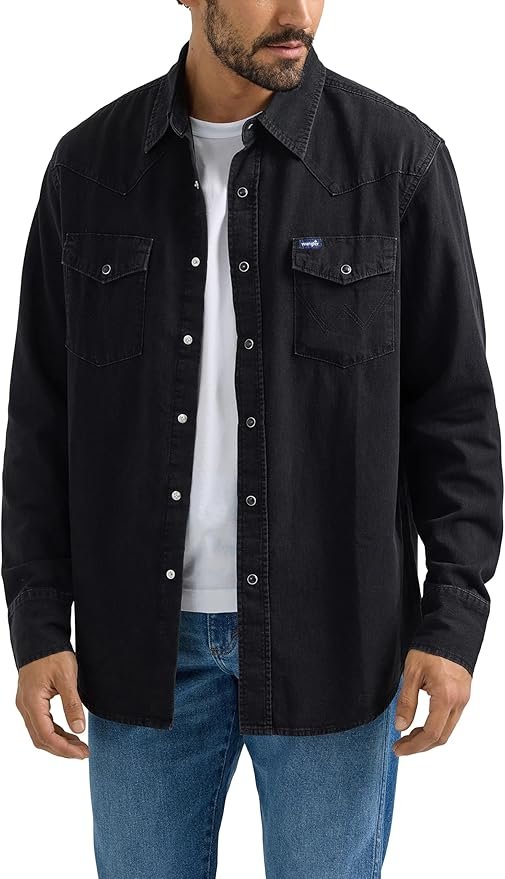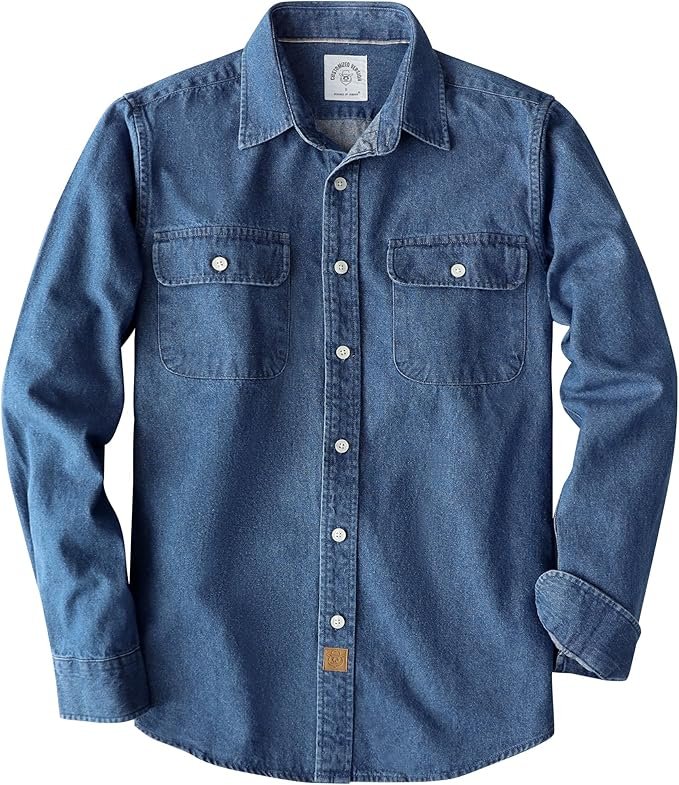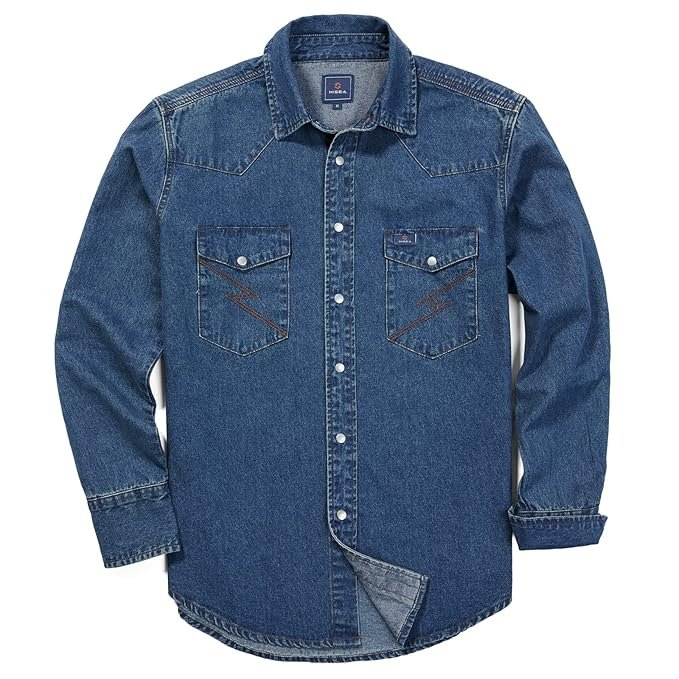The word “denim” itself originates from the French town of Nîmes, where textile makers produced a sturdy twill fabric they called “serge de Nîmes” (serge from Nîmes). Concurrently, manufacturers in Genoa, Italy, produced a similar fustian fabric, which the French called “Gênes,” the root of the modern word “jeans.” Both traditions contributed to the cotton twill weave that defines modern denim shirts for men. Manufacturers valued this material for its exceptional durability and its unique indigo dyeing process.
This dyeing method, which only colors the surface warp threads, allows the fabric to fade and soften over time, creating a personalized garment. This tough, adaptable textile provided the perfect foundation for clothing designed to withstand immense physical stress, long before it ever became a fashion statement.
The denim shirts for men emerged in the late 19th century as a direct response to the demands of physical labor in the American West. Levi Strauss, already famous for his riveted denim waist overalls, recognized the need for an equally durable upper-body garment. He and other manufacturers began producing simple, utilitarian shirts for miners, railroad workers, and farmers. These early iterations prioritized function over all else. They featured simple, boxy cuts, reinforced stitching, and sturdy buttons, all designed to endure the grit, sweat, and strain of a manual laborer’s day. They were not fashion items; they were essential pieces of protective equipment designed to outlast the wearer’s grueling work.
As the 20th century dawned, the simple work shirt evolved into the specialized “Western” denim shirts for men, a style that defined the American cowboy. Companies like Lee and Wrangler innovated new features tailored to the rodeo and ranch. They introduced pointed yokes across the chest and back, which provided extra strength at stress points and a distinctive, V-shaped look. Perhaps most importantly, they popularized pearl snap buttons. These snaps allowed a rancher snagged on a fence or a bullhorn to break free from the shirt quickly, preventing serious injury. This specialized design, born from practical necessity, created a powerful and romantic aesthetic that would later dominate Western-inspired fashion.
World War II significantly accelerated denim’s transition from pure workwear to a broader cultural staple. The U.S. Navy and Army issued denim dungarees and fatigue uniforms to millions of servicemen for onboard duty and manual labor. This massive, institutional adoption introduced the fabric to a new generation denim shirts for men from all walks of life, many of whom had never worked in a mine or on a farm. These soldiers and sailors experienced firsthand the comfort, durability, and practicality of denim. When they returned to civilian life after the war, they brought their affinity for the fabric with them, beginning the slow process of integrating the rugged material into their everyday, off-duty wardrobes.
The 1950s cemented the denim shirts for men status as an icon of rebellion, thanks almost entirely to Hollywood. Actors like Marlon Brando, James Dean, and a young Elvis Presley championed a rugged, anti-establishment look. Wearing a denim shirt, often paired with matching jeans in the “Canadian tuxedo,” signaled a clear rejection of the era’s conformist, suit-and-tie culture. It became the unofficial uniform of the “bad boy” and the teen rebel, a potent symbol of youthful angst and cool indifference. Filmmakers used this garment as visual shorthand to instantly communicate a character’s rebellious nature and detachment from the mainstream.
The cultural movements of the 1960s and 1970s seized the denim shirts for men and propelled it into the mainstream. The hippie and anti-war movements adopted denim as a symbol of their “back-to-the-land” ethos and their rejection of corporate America. It was the antithesis of the slick, synthetic polyester suit. This era championed personalization; people heavily customized their shirts with embroidery, peace signs, patches, and tie-dye, turning the garment into a canvas for self-expression. By the 1970s, its rebellious edge softened, and the denim shirt became a ubiquitous casual staple for men, women, and children, prized for its comfortable, lived-in feel.
High fashion finally embraced the humble work shirt in the 1980s and 1990s. Designers like Calvin Klein transformed the denim shirts for men from a casual basic into a status symbol, using provocative, high-budget advertising to sexualize the garment. Guess Jeans pushed the “stone-washed” and “acid-washed” finishes, creating new textures and aesthetics that defined the 80s. Ralph Lauren, meanwhile, absorbed the denim shirts for men into his vision of idealized American heritage, placing it alongside oxford shirts and polo-wear. In the 90s, the shirt’s versatility peaked. Grunge bands wore them oversized and flannel-lined, while hip-hop artists integrated them into their layered, baggy silhouettes.
The new millennium, particularly the 2010s, sparked a “heritage” revival in menswear. Discerning consumers grew interested in authenticity and craftsmanship, rejecting the disposable fast-fashion of the previous decade. This movement revitalized the denim shirts for men. Brands like A.P.C., Nudie Jeans, and numerous Japanese labels began meticulously reproducing vintage Western shirts or creating new versions using high-end “selvedge” denim shirts for men, woven on old-fashioned shuttle looms. This “denimhead” culture celebrates the fabric’s origins, focusing on raw denim that requires the wearer to “break in” the shirt themselves, creating unique, personal fade patterns over years of wear.
Today, the denim shirts for men demonstrates unparalleled versatility, existing in countless iterations for every conceivable context. Luxury brands craft them from lightweight chambray or silk-denim blends, suitable for a creative office. Heritage brands continue to produce rugged, heavyweight work shirts for laborers and stylists alike. Fast-fashion labels churn out endless variations in cuts and washes. This ubiquity, however, has brought scrutiny. The industry now grapples with the environmental cost of cotton farming and indigo dyeing. In response, leading manufacturers actively innovate, developing sustainable practices like using organic or recycled cotton, laser finishing to reduce water use, and closed-loop dyeing systems.
The history of the denim shirts for men charts a remarkable journey from pragmatic utility to global fashion icon. It began as a simple, durable garment designed to protect laborers from the elements. The American cowboy imbued it with a rugged, individualistic spirit. Hollywood rebels transformed it into a symbol of counter-culture. Musicians and designers adopted it as a canvas for expression. Through each decade, the denim shirt has absorbed and reflected the cultural shifts around it. Its enduring appeal lies in this unique paradox: it is simultaneously a timeless classic and a deeply personal garment, a piece of history that wearers continue to write with every fade and tear.
Here are the top 5 Denim Shirts for Men
| S.NO | NAME | PRICE | LINK |
| 1 | Levi’s Barstow Western Denim Shirts for Men | 3952 INR | BUY NOW |
| 2 | Wrangler Iconic Denim Shirts For Men | 3419 INR | BUY NOW |
| 3 | Lee The Denim Shirts For Men | 2828 INR | BUY NOW |
| 4 | Dubinik® Denim Shirts | 3776 INR | BUY NOW |
| 5 | HISEA | 14,251 INR | BUY NOW |
Levi’s Barstow Western Denim Shirts for Men

The Levi’s Barstow Western Snap Shirt is an iconic and rugged garment that serves as a modern staple while paying homage to classic American West workwear. It is distinguished by its signature Western detailing, featuring a snap-button placket and a pointed, stylized yoke across the shoulders, which is a hallmark of the traditional cowboy shirt. The design includes two snap-button flap pockets on the chest, further contributing to its utilitarian and Western aesthetic.
Crafted most commonly from durable denim or a cotton blend, the Barstow shirt offers a comfortable, often Standard or Regular fit, which can be worn effortlessly on its own or layered over a t-shirt. It is celebrated for its ability to define a timeless American style, offering a garment that is both functional and fashion-forward, with the potential to age beautifully and gain character through wear and washing.
Specifications
| Feature | Typical Detail |
| Fit | Often a Standard Fit and Slim or Relaxed fit. |
| Material | 100% Cotton |
| Collar | Point or Kent Collar |
| Placket | Snap Placket |
| Pockets | Western-style chest pockets |
| Yoke | Pointed Western yokes |
| Hem | Curved shirttail hem |
| Sleeves | Long sleeves with snap cuffs. |
| Care | Machine wash cold, tumble dry medium |
Pros
- Classic & Stylish Look
- Versatility
- Quality & Durability
- Comfort
Cons
- Sizing Inconsistency/Fit
- Material Weight
- Top Button
Wrangler Iconic Denim Shirts For Men

The Wrangler Iconic Denim Snap Shirt, often referencing the classic 27MW Western Shirt style, is a long-sleeve, regular-fit garment rooted in authentic American cowboy heritage. Crafted from durable cotton denim, it features classic Western-inspired details that provide both functionality and timeless style. Key elements include Western-style pointed yokes across the chest and back, a pointed collar, and a full snap-button closure—typically featuring pearl snaps—for easy wear and an authentic vintage look.
The shirt is equipped with two spade or flap chest pockets, traditionally finished with Wrangler’s signature ‘W’ stitching. Designed for versatility, this shirt works as a comfortable everyday casual piece, a work shirt, or a layering item over a favorite tee, ensuring it remains a staple that embodies the spirit of rugged authenticity.
Specifications
| Feature | Detail |
| Fit | Regular Fit or Classic Fit |
| Material | 100% Cotton Denim |
| Closure | Pearl Snap Closures |
| Pockets | Two Front Spade Snap Pockets |
| Yokes | Western Yokes |
| Hem | Curved Hem |
| Care | Machine washable |
| Style | Classic Western/Cowboy Shirt. |
Pros
- Authentic Western Style
- Versatile
- Comfortable Fabric
- Durable
- Value
Cons
- Shrinkage Potential
- Fit Nuances
- Snaps Durability
- Fabric Weight
Lee The Denim Shirts For Men

Lee denim shirts blend the brand’s legendary 130-year heritage in authentic, durable workwear with modern fit and comfort. Crafted from 100% premium cotton, these shirts are prized for their soft feel and durability that only improves with age. The collection features classic Western styles with snap buttons and pointed yokes, alongside versatile Casual Shirts.
Available in Slim Fit for a tailored look and Regular Fit for easy layering, Lee offers a range of washes from light to deep indigo, ensuring a versatile staple that can be effortlessly dressed up or down.
Specifications
| Feature | Specification Details |
| Material | 100% Organic Cotton |
| Fabric | Compact 2/1 Twill Denim |
| Collar Style | Button-down collar |
| Fit System | Multiple sizes and three different lengths |
| Manufacturing | Cut and sewn in Portugal. |
Pros
- Exceptional Quality & Durability
- Traceability and Sustainability
- Superior Fit System
- Versatile Design
Cons
- High Price Point
- Heavy Fabric
- Sizing Inconsistency
- Minimalist Style
Dubinik® Denim Shirts For Men

The Dubinik denim shirt is a versatile and durable piece designed for comfortable, casual, and work wear. It is typically constructed from 100% cotton denim shirts for men which provides a soft, strong, and stretchy feel, ensuring comfort and warmth for spring, autumn, and winter. The shirt is characterized by a classic Western aesthetic, often featuring a sleek over-the-shoulder yoke and delicate pearl snap buttons for both aesthetic appeal and a secure closure.
Customers appreciate that the denim shirts for men are pre-shrunk during production to minimize fading and shrinking after washing, making maintenance easy as they are both machine and hand washable. They also feature two practical chest pockets for convenient storage, a regular fit (though slim-fit options may also be available), and a design that is generally less prone to wrinkling, solidifying its position as a comfortable, timeless, and functional casual work shirt.
Specifications
| Feature | Description |
| Material | 100% Cotton |
| Fit | Regular Fit |
| Style | Casual and Timeless |
| Closure | Button-down |
| Pockets | Two practical chest pockets |
| Comfort & Feel | Not flimsy but sturdy and soft |
| Color Variety | Black Denim, Blue Denim, Grey Denim, and Light Blue Denim. |
| Maintenance | Machine washable and resistant to wrinkling. |
Pros
- Exceptional Fabric Quality
- Refined Italian Craftsmanship
- Elegant Styling Details
- Versatile Fit Options
- Timeless Aesthetic
Cons
- High-End Price Point
- Collar Stiffness
- Perceived Durability Concerns
- Limited Utility Style
HISEA

HISEA denim shirts are designed as rugged, dependable workwear, prioritizing durability, comfort, and utility. They are often featured as a “Work Shirt” and are constructed from a sturdy, preshrunk, and wrinkle-resistant cotton denim, frequently noted to be around 7.8 oz, ensuring they withstand the daily wear and tear of tough jobs.
These shirts typically offer a Regular Fit to ensure maximum comfort and an excellent range of motion, which is essential for tasks like carpentry, welding, or farm work. Utilitarian features are a hallmark of the design, commonly including a clean button-up front, a spread collar, and most importantly, two flap chest pockets with snap buttons for quick and secure access to tools or personal essentials. With reinforced seams and shoulders, the HISEA denim shirts for men is a practical, easy-care classic available in solid colors like Black, Grey, and various washes of Blue, serving as a reliable layer for both the job site and casual everyday wear.
Specifications
| Feature | Typical Details |
| Fabric/Material | Cotton or Cotton Blend |
| Weave Pattern | Denim or Chambray |
| Fit | Regular Fit, Relaxed Fit, or Slim Fit |
| Collar | Spread Collar or Mandarin/Band Collar |
| Sleeves | Roll-up tab |
| Pockets | One or two patch pockets |
| Hem | Curved hem |
| Transparency | Opaque |
| Care | Machine wash |
| Style | Solid, faded, or sometimes checked patterns. |
Pros
- Affordability & Value
- Good Style/Design
- Comfort & Fit
- Wide Availability
Cons
- Inconsistent Quality
- Color Fading
- Durability Issues
- Sizing/Proportions
Discover Our Jeans: The Perfect Pairings for Every Denim Shirt. Also discover Our Sunglasses: The Perfect Pairings for Every Outfit.”

